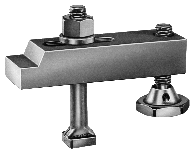|
Services for Plastics, Inc.
Mold clamps are offered in a variety of styles and sizes, we can provide whatever your needs may be.
Mold Clamp Bodies
All mold clamp bodies manufactured of hardened Premium Quality Steel.
Bolts or Clamping Screws
Manufactured from high-strength, Grade 5 quality steel.
Washers
Manufactured from 12L14 Tool Steel, carbonized for hardness.
Description of Styles
Machined mold clamps
Open toe style:.........................Heavy Duty (with swivel-base adjusting screw)
Open toe style:.........................Extra Heavy Duty (with swivel-base adjusting screw)
Closed toe style:.......................Extra Heavy Duty (with swivel-base adjusting screw)
Open toe style:.........................Heavy Duty (with non-swivel-base)
Closed toe style:.......................Extra Heavy Duty-Designed for T-Slotted machines (with swivel-base adjusting screw)
--Also available with Non-swivel base--
We Offer Replacement Parts
-
Individual mold clamp bodies
-
Extra large adjusting screw assemblies
-
Hex head adjusting screws
-
High strength, Grade 5, Hex head clamping screws
-
High strength, T-slot bolts
-
Heavy duty hex nuts for T-slot bolts
-
Round mold washers
-
Extra large round mold washers
-
Extra large no-twist rectangular washers
Mold Clamping Tips
-
Place clamping bolt as close to mold to obtain the maximum mold holding pressure, adjust clamp to parallel, meaning in a straight parallel line with platen and mold slot and not at an angle.
-
Clamps must be set parallel to press which is critical for equal clamping of entire mold. The proper set-up, adequate number of clamps and the correct size of clamps in relation to mold size will insure safer and better mold-set up and decreased production down time.
Injection Molding Safety
Historically the injuries from injection molding machines have included crushing during the cycle of the machine, burns, slips, trips and falls due to oil or plastic pellets on the walking surfaces. There are reported deaths as a result of a mold falling off the platen
Mold Set Procedure
Perhaps a review of your procedures would be beneficial.
Inspection
Inspect the press and surrounding area including auxiliary equipment
-
Is the area clean and free of hazards?
-
Is the other equipment that could be hazardous during the operation locked out?
-
Is the mold strapped together with the correct mold straps?
-
Are the bolts tight?
-
Did you perform the daily inspection of hoist or crane.
Platen Bolt Holes
Correct Clamps
-
Do you have the correct clamps for the size of the mold?
-
Are the clamps, bolts, adjusting screws, or washers bent or cracked?
-
How many clamps do you need to hold the mold?
-
How many go on the bottom, top and sides?
-
Are clamps evenly spaced? PROPER placement of clamps is essential.
-
Do you clamp the bottom or top first?
Clamp Installation
-
Have you reviewed the clamp manufacture’s information for proper installation?
-
Bolts for clamps must be correct in size and correct grade?
-
Are the bolts in good condition?
-
Check the manufacture’s torque information for bolts.
-
How much torque is to be placed on the bolts?
-
Is a torque wrench available?
-
Don't rely on air pressure to properly torque bolts!
Engineering MUST Be Involved
Engineering in your workplace must be involved in the “Mold Set Procedure”.
These are just a sample of items that must be reviewed.
Remember that the people involved in the mold setting process must be
properly trained in all of the necessary steps.
SAE Torque Standards For Bolts
The SAE has established a sequence of grades from 0 to 8 for steel bolts, on the basis of the metal from which the bolt is made and the manner of manufacture.
Our Grade 5 bolts
Suggested Torque Settings in foot pounds
| 1/4" |
7 foot pounds |
| 5/16" |
14 foot pounds |
| 3/8" |
25 foot pounds |
| 7/16" |
40 foot pounds |
| 1/2" |
60 foot pounds |
| 9/16" |
88 foot pounds |
| 5/8" |
120 foot pounds |
| 3/4" |
200 foot pounds |
| 7/8" |
302 foot pounds |
| 1" |
466 foot pounds |
Rule Of Thumb
As a rule, when a bolt is installed the nut (over a washer) should be turned and not the bolt's head. Unless a torque wrench is used, the tendency is to under-tighten large bolts and over-tighten small ones. The above suggestions do not apply of the bolt has been specially lubricated.
Click here for more information on Mold Clamps
|
![]()

![]()